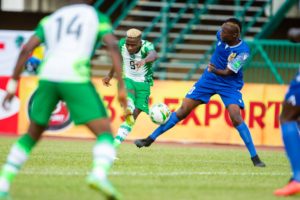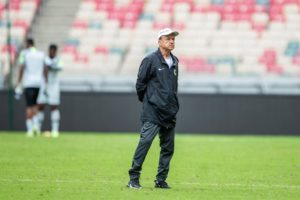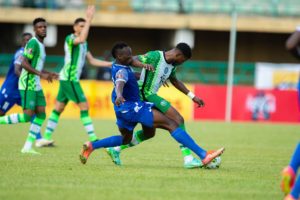Nigeria facing questions on and off the pitch after humbling defeat

International football regularly throws up shocks and upsets, but few matches can compare to Nigeria losing at home to minnows Central African Republic. It was the first loss the Super Eagles have suffered at home in World Cup qualifying for 40 years and could not have come in more embarrassing fashion. The Nigeria side, full of players at top clubs in Europe conceded the only goal of the match in the last minute to Karl Namnganda, a centre forward currently plying his trade in the fourth tier of French football.
The Super Eagles went some way to repairing the damage by winning the return fixture 2-0, and thanks to the lack of any competition in their group, will almost certainly progress to the next round of qualifying. However, performances, and results in recent years have been generally declining. Last year the Super Eagles drew home and away against Sierra Leone, the home match featuring a 4-0 lead thrown away in a humiliation nearly equal to Thursday’s humbling defeat.
While criticisms about team selection will come back to haunt manager Gernot Rohr, the dreadful nature of the result points to far deeper issues in the Nigeria Football Federation set-up.
In the build-up to the match, it was revealed that Rohr has not been paid for the last eight months by the Nigeria Football Federation (NFF). Since the reports came out, the German trainer has been paid five months wages via NFF’s sponsors. They have also reportedly agreed to pay seven months wages to Rohr as well as assistant coach Joseph Yobo and goalkeeper coach Alloy Agu. However, it also was revealed that Rohr had been paying some of his backroom staff’s wages out of his own pocket.

This all comes in a time of record financial investment in the NFF from outside sponsors. In the last couple months, the NFF have signed multiple sponsorship deals to bring in huge amounts of corporate investment. Deals have been made with airlines, banks, telecoms, and gaming companies, but the money has not yet made its way to the squad in any meaningful way.
The NFF does not have the best track record over the years of proper management and correct use of funds. The latest Executive Committee of the NFF, led by Amaju Pinnick, came into power in 2014 following the World Cup Scandal, but has not been without controversy itself. In 2016 a Nigerian federal court invalidated the election Pinnick won, and was only thrown out when FIFA intervened, saying that the court was interfering with the NFF. More recently in 2019, Pinnick and several other senior NFF members were accused by the federal government for alleged mismanagement of over $8 million received from FIFA for participation at the 2014 World Cup.
Both managers proceeding Rohr complained about payments being paid late or not at all. Iconic playmaker Sunday Oliseh, who resigned from the post because of issues with the Federation, was even more critical when talking about his own treatment compared to Rohr’s. Oliseh cited the fact that Rohr, a foreigner, is being paid more than four times what Oliseh or his fellow Nigerian predecessor Stephen Keshi received, before declaring that he will never come back to coach the national side if it remains in the same state.
Super Eagles and Rangers FC centre-back Leon Balogun recently came out with similar criticisms about unpaid wages in an interview on the Beautiful Game podcast saying,
“About the bonuses [not being paid], it’s not even a secret. I’ve read something recently where people in charge contradict themselves saying things have been paid then they admit they haven’t been paid.”
Balogun’s criticisms went much further than complaints over payment, pointing to a lack of infrastructure in the national set up leading to poor performances.
“You hear about other players and why can’t they not perform in the Super Eagles. We have to be honest, the infrastructure, we are not being provided [with the best materials?] to do our job,”

Balogun, who played in both matches against CAR, compared the treatment of the Nigeria squad to that of other African nations, citing it as a reason why the country is not producing the kind of talent that the NFF and the wider country aspires to. While other rivals in Africa, like Morocco, and Egypt continue to develop world class pitches and training facilities, Nigeria is forced to train and play in different locations around the country and on pitches below the quality befitting their players.
Rohr will undoubtedly have his last chance to keep his job in January when the Africa Cup of Nations kicks off. Anything less than a semi-final or final appearance will certainly see him being relieved of duty, and perhaps even that will not save him. However, the clear issues in infrastructure, investment and corruption within Nigerian football will continue to hold back the Super Eagles long after Rohr’s eventual departure. With other African nations, particularly in the north of the continent, continuing to invest in facilities and infrastructure the Super Eagles may find themselves falling further and further behind the other giants of African football.